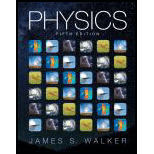
Physics (5th Edition)
5th Edition
ISBN: 9780321976444
Author: James S. Walker
Publisher: PEARSON
expand_more
expand_more
format_list_bulleted
Concept explainers
Question
Chapter 31, Problem 2CQ
(a)
To determine
The light given off by a neon sign is continuous in distribution or in the form of a line spectrum.
(b)
To determine
The light given off by an incandescent light bulb is continuous in distribution or in the form of a line spectrum.
Expert Solution & Answer
Want to see the full answer?
Check out a sample textbook solution
Students have asked these similar questions
Consider the circuit shown in the figure. The battery has emf ε = 69 volts and negligible internal resistance. The inductance is L = 0.4 H and the resistances are R 1 = 12 Ω and R 2 = 9.0 Ω. Initially the switch S is open and no currents flow. Then the switch is closed. After leaving the switch closed for a very long time, it is opened again. Just after it is opened, what is the current in R 1?
A capacitor with a capacitance of C = 5.95×10−5 F is charged by connecting it to a 12.5 −V battery. The capacitor is then disconnected from the battery and connected across an inductor with an inductance of L = 1.55 H . At the time 2.35×10−2 s after the connection to the inductor is made, what is the current in the inductor? At that time, how much electrical energy is stored in the inductor?
Can someone help me with this question. Thanks.
Chapter 31 Solutions
Physics (5th Edition)
Ch. 31.1 - Prob. 1EYUCh. 31.2 - Prob. 2EYUCh. 31.3 - Prob. 3EYUCh. 31.4 - Prob. 4EYUCh. 31.5 - Prob. 5EYUCh. 31.6 - Prob. 6EYUCh. 31.7 - Prob. 7EYUCh. 31 - Prob. 1CQCh. 31 - Prob. 2CQCh. 31 - Prob. 3CQ
Ch. 31 - Prob. 4CQCh. 31 - Prob. 5CQCh. 31 - Prob. 6CQCh. 31 - Prob. 7CQCh. 31 - Prob. 8CQCh. 31 - Prob. 9CQCh. 31 - Prob. 1PCECh. 31 - Prob. 2PCECh. 31 - Prob. 3PCECh. 31 - Prob. 4PCECh. 31 - Prob. 5PCECh. 31 - Prob. 6PCECh. 31 - Prob. 7PCECh. 31 - Prob. 8PCECh. 31 - Prob. 9PCECh. 31 - Prob. 10PCECh. 31 - Prob. 11PCECh. 31 - Prob. 12PCECh. 31 - Prob. 13PCECh. 31 - Prob. 14PCECh. 31 - Prob. 15PCECh. 31 - Prob. 16PCECh. 31 - Prob. 17PCECh. 31 - Prob. 18PCECh. 31 - Prob. 19PCECh. 31 - Prob. 20PCECh. 31 - Prob. 21PCECh. 31 - Prob. 22PCECh. 31 - Prob. 23PCECh. 31 - Prob. 24PCECh. 31 - Prob. 25PCECh. 31 - Prob. 26PCECh. 31 - Prob. 27PCECh. 31 - Prob. 28PCECh. 31 - Prob. 29PCECh. 31 - Prob. 30PCECh. 31 - Prob. 31PCECh. 31 - Prob. 32PCECh. 31 - Prob. 33PCECh. 31 - Prob. 34PCECh. 31 - Prob. 35PCECh. 31 - Prob. 36PCECh. 31 - Prob. 37PCECh. 31 - Prob. 38PCECh. 31 - Prob. 39PCECh. 31 - Prob. 40PCECh. 31 - Prob. 41PCECh. 31 - Prob. 42PCECh. 31 - Prob. 43PCECh. 31 - Prob. 44PCECh. 31 - Prob. 45PCECh. 31 - Prob. 46PCECh. 31 - Prob. 47PCECh. 31 - Prob. 48PCECh. 31 - Prob. 49PCECh. 31 - Prob. 50PCECh. 31 - Prob. 51PCECh. 31 - Prob. 52PCECh. 31 - Give the electronic configuration for the ground...Ch. 31 - Prob. 54PCECh. 31 - Prob. 55PCECh. 31 - Prob. 56PCECh. 31 - The configuration of the outer electrons in Ni is...Ch. 31 - Prob. 58PCECh. 31 - Prob. 59PCECh. 31 - Prob. 60PCECh. 31 - Prob. 61PCECh. 31 - Prob. 62PCECh. 31 - Prob. 63PCECh. 31 - Prob. 64PCECh. 31 - Prob. 65PCECh. 31 - Prob. 66PCECh. 31 - Prob. 67PCECh. 31 - Prob. 68GPCh. 31 - Prob. 69GPCh. 31 - Prob. 70GPCh. 31 - Prob. 71GPCh. 31 - Prob. 72GPCh. 31 - Prob. 73GPCh. 31 - Prob. 74GPCh. 31 - Prob. 75GPCh. 31 - Prob. 76GPCh. 31 - Prob. 77GPCh. 31 - Prob. 78GPCh. 31 - Prob. 79GPCh. 31 - Prob. 80GPCh. 31 - Prob. 81GPCh. 31 - Prob. 82GPCh. 31 - Prob. 83GPCh. 31 - Prob. 84PPCh. 31 - Prob. 85PPCh. 31 - Prob. 86PPCh. 31 - Prob. 87PPCh. 31 - Prob. 88PPCh. 31 - Prob. 89PP
Knowledge Booster
Learn more about
Need a deep-dive on the concept behind this application? Look no further. Learn more about this topic, physics and related others by exploring similar questions and additional content below.Similar questions
arrow_back_ios
SEE MORE QUESTIONS
arrow_forward_ios
Recommended textbooks for you
 Modern PhysicsPhysicsISBN:9781111794378Author:Raymond A. Serway, Clement J. Moses, Curt A. MoyerPublisher:Cengage Learning
Modern PhysicsPhysicsISBN:9781111794378Author:Raymond A. Serway, Clement J. Moses, Curt A. MoyerPublisher:Cengage Learning College PhysicsPhysicsISBN:9781938168000Author:Paul Peter Urone, Roger HinrichsPublisher:OpenStax College
College PhysicsPhysicsISBN:9781938168000Author:Paul Peter Urone, Roger HinrichsPublisher:OpenStax College Physics for Scientists and Engineers with Modern ...PhysicsISBN:9781337553292Author:Raymond A. Serway, John W. JewettPublisher:Cengage Learning
Physics for Scientists and Engineers with Modern ...PhysicsISBN:9781337553292Author:Raymond A. Serway, John W. JewettPublisher:Cengage Learning University Physics Volume 3PhysicsISBN:9781938168185Author:William Moebs, Jeff SannyPublisher:OpenStax
University Physics Volume 3PhysicsISBN:9781938168185Author:William Moebs, Jeff SannyPublisher:OpenStax Principles of Physics: A Calculus-Based TextPhysicsISBN:9781133104261Author:Raymond A. Serway, John W. JewettPublisher:Cengage Learning
Principles of Physics: A Calculus-Based TextPhysicsISBN:9781133104261Author:Raymond A. Serway, John W. JewettPublisher:Cengage Learning

Modern Physics
Physics
ISBN:9781111794378
Author:Raymond A. Serway, Clement J. Moses, Curt A. Moyer
Publisher:Cengage Learning

College Physics
Physics
ISBN:9781938168000
Author:Paul Peter Urone, Roger Hinrichs
Publisher:OpenStax College

Physics for Scientists and Engineers with Modern ...
Physics
ISBN:9781337553292
Author:Raymond A. Serway, John W. Jewett
Publisher:Cengage Learning

University Physics Volume 3
Physics
ISBN:9781938168185
Author:William Moebs, Jeff Sanny
Publisher:OpenStax

Principles of Physics: A Calculus-Based Text
Physics
ISBN:9781133104261
Author:Raymond A. Serway, John W. Jewett
Publisher:Cengage Learning
